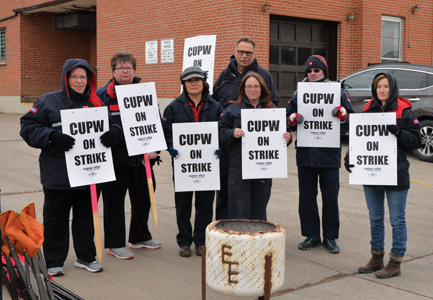Current Temperature
15.5°C
Broad view of mail strike needed
Posted on November 7, 2018 by Taber Times ON STRIKE: On Monday morning, Taber postal workers hit the street outside the Taber Canada Post office to show solidarity during Canadian Union of Postal Workers ongoing rotating strikes across Canada. TIMES PHOTO BY COLE PARKINSON
ON STRIKE: On Monday morning, Taber postal workers hit the street outside the Taber Canada Post office to show solidarity during Canadian Union of Postal Workers ongoing rotating strikes across Canada. TIMES PHOTO BY COLE PARKINSONThe words “high stakes” and “mail carrier” don’t seem to go together, but new job action by postal workers in Canada features some large, important questions for the local and national economies.
Already in the dispute, involving rotating strikes in some of Canada’s major centres, we’ve been treated to a host of stand-pat, cliché arguments about the post office.
Don’t people use email?
How much will this cost taxpayers?
Why should average Canadians support public sector pensions and better pay for public servants?
Firstly, no tax revenue goes into Canada Post, despite the widely and strongly held views to the opposite, and this strike is specifically regarding upping wages for rural mail carriers.
People do use email, but it’s still hard to directly beam via the Internet any of an increasing number of physical goods that people order online.
However, it’s a standing argument that Canada Post is no longer needed.
People have been saying for a decade or more that it would soon be extinct, privatized or collapsed under the bloat of bureaucracy.
And while mail patterns have changed and letter mail decreased, package and parcel trade has increased in step with the rising tide of e-commerce.
The wave that’s just breaking now is cannabis, by the way, and it is a big wave.
Rotating strikes might not bother the average sender or recipient of a letter, but imagine the strain it’s putting on officials with provincial cannabis regulators.
Or in the boardrooms of the suddenly massive legal industry, or in other online retailers who rely on Canada Post’s parcel service, Purolator.
One could actually argue that small business owners and local retailers benefit from higher postal rates.
If the critical emerging threat to their business is online buying that requires shipment, then the cost of their own stamps is immaterial.
It all leads into a larger discussion of who exactly will be earning a living in the decades ahead, when the full weight of watchwords like e-commerce and automation are realized.
Already, people throughout Canada and North America feel the economy is turned upside down and against them, that we don’t produce anything anymore, just consume.
The Canadian Union of Postal Workers clearly feels its members deserve a share in that future economy.
After a decade of being behind the eight ball in negotiations, the union has some bargaining power.
Is it pure coincidence that they called 72-hour strike notice two days after legal cannabis went live?
In that vein, mail volumes are set to rocket upward in the nearby City of Medicine Hat.
A planned massive cannabis greenhouse there will have a production capacity of 150,000 kilograms each year that will be handled by the Crown agency.
That equates to 5.3 million ounces that will be handled in boxes and envelopes.
Even with bulk shipments, at the very least, a few more million parcels could be running through the local depot by this time next year.
Multiply that across Canada, and if the Earth-shatteringly extraordinary move of legalized cannabis can’t create some measure of job security in related industry, then what’s the point?
Similarly, the main rallying point for the union has been to equalize the wages between urban carriers, mostly men, and their lower-paid rural area colleagues, who happen to be mostly women.
Are people in vast southern Alberta really against higher wages for workers in smaller centres? But people are also consumers, and many consider themselves consumers first, and the cold hard fact is that higher prices hurt consumers.
Perhaps, though, it’s time we all took a clear view of the facts when determining what can help the average worker in a changing economy.
Leave a Reply
You must be logged in to post a comment.

